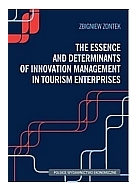|
||
Strona główna > opis książki
podział tematyczny • wydawnictwa anglojęzyczne podział tematyczny Newsletter: • Zamów informacje o nowościach z wybranego tematu Informacje: • sposoby płatności i dostawy • kontakt • Cookies na stronie • Regulamin zakupów Napisz propresssp@gmail.com |
THE ESSENCE AND DETERMINANTS OF INNOVATION MANAGEMENT IN TOURISM ENTERPRISESZONTEK Z.wydawnictwo: PWE , rok wydania 2019, wydanie Icena netto: The
Essence and Determinants of Innovation Management in Tourism Enterprises The monograph discusses an overview of issues related to an empirical analysis of the determinants of innovation management in tourism enterprises. From among the determinants of innovation, particular attention is paid here to: anthropogenic determinants of innovation – the role of people and their creativity, cooperation and partnership – coopetition and tourism clusters, and conditions for the division of roles on the market – the role of efficient relations with customers and demand approach to the development of innovation in tourism. The element linking these conditions and simultaneously increasing their aptitude is knowledge, and its transfer within the framework of the innovative environment. The results presented in this monograph derive from research conducted in Poland among tourism enterprises. The research has allowed identification of the most important actions, which have a significant impact on the innovation of tourism enterprises. On the basis of analysis of secondary sources, new primary research, a catalogue of the activities these entities must undertake was developed. These activities apply to both innovators and to the final recipients of innovative solutions (open innovation). Creating innovation in tourism should result from the implementation of public sector activities, both at the local, regional and national level, the private sector and the sector of supporting institutions, including: universities, research and development units, advisory centres, guarantee funds, business incubators, and also technology transfer centres, local associations and organizations. However, cooperation between individual entities in these sectors is also important. In modern society, oriented to the development of new information techniques, innovations have more and more utility in creating preferences in the tourism market. Innovation implies new solutions to problems of tourism services and issues, which involve a change of actual state, and it has an important part to play in the development of some fields of the tourism business. This monograph is intended for tourism industry entrepreneurs, students of management and tourism faculties. and all those interested in innovations. We współczesnym społeczeństwie, nastawionym na rozwój nowoczesnych technik informacyjnych, coraz większe znaczenie w kształtowaniu preferencji na rynku turystycznym mają innowacje. Monografia ma na celu analizę i empiryczną weryfikację uwarunkowań zarządzania innowacjami w przedsiębiorstwach turystycznych. Szczególną uwagę zwrócono na znaczącą rolę: zasobów ludzkich i ich kreatywności w podnoszeniu innowacyjności przedsiębiorstwa, uwarunkowań współpracy, w tym koopetycji oraz klastrów turystycznych, a także uwarunkowań podziału ról na rynku. Elementem spajającym te uwarunkowania i podnoszącym ich użyteczność jest wiedza i jej transfer w ramach środowiska innowacyjnego. W monografii przedstawione zostały wyniki badań, którymi zostały objęte polskie przedsiębiorstwa turystyczne. Na podstawie analizy źródeł wtórnych oraz przeprowadzonych badań pierwotnych opracowany został katalog działań koniecznych do podjęcia przez poszczególne podmioty kreujące usługi turystyczne i wspierające ich rozwój. Działania te dotyczą zarówno twórców innowacji, jak i finalnych odbiorców rozwiązań innowacyjnych (open innovation). Kreowanie innowacji w turystyce powinno być efektem realizacji działań sektora publicznego, zarówno na poziomie lokalnym, regionalnym, jak i krajowym, sektora prywatnego oraz sektora instytucji wspomagających, obejmujących: szkoły wyższe, jednostki badawczo-rozwojowe, ośrodki doradcze, fundusze poręczeń, inkubatory przedsiębiorczości, a także centra transferu technologii, lokalne stowarzyszenia i organizacje. Z drugiej strony istotna jest również współpraca poszczególnych podmiotów tych sektorów. Introduction 1. Innovation and the innovative process 1.1. Innovation 1.1.1. The essence of innovation 1.1.2. Innovativeness and its importance 1.1.3. Innovation management 1.2. The innovative process 1.2.1. Defining the innovation process 1.2.2. Typology of innovation 1.2.3. Sources of innovation 1.3. Antecedents of innovation in world research 2. Innovation in tourism - the complexity of the concept 2.1. Tourism and diversity of entities involved in it 2.1.1. The essence of tourism 2.1.2. Classification of tourism market entities 2.1.3. The role of the public sector in the development of tourism 2.1.4. Involvement of the local community in the development of tourism 2.2. Innovations in tourism and their division 2.2.1. The obligation of innovation in services 2.2.2. Attributes of innovative enterprises 2.2.3. Typology of tourism enterprises‘ innovations 2.3. The effects of innovation in tourism 2.4. Barriers to innovation of tourism enterprises 3. Determinants of innovative processes in tourism 3.1. Anthropogenic determinants of innovation 3.1.1. The role of human resources in the creation of innovation 3.1.2. The importance of creativity in the development of innovation 3.2. Conditions for cooperation and partnership 3.2.1. Innovative forms of cooperation between tourism entities - coopetition 3.2.2. Partner networks (clusters) as a form of organizational innovation in the tourism industry 3.3. Conditions for the division of roles on the market 3.3.1. Management of relations between a tourism company and its clients 3.3.2. Demand approach to the development of innovation in tourism 3.4. Modelling innovation management in tourism 4. Innovation management in tourism enterprises in empirical research 4.1. Methodology of research and spatial range 4.2. Survey results 4.3. Recommended directions of innovation management in tourism Conclusions Bibliography List of tables List of figures List of charts Appendix 148 pages, Paperback Księgarnia nie działa. Nie odpowiadamy na pytania i nie realizujemy zamówien. Do odwolania !. |


